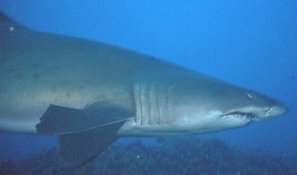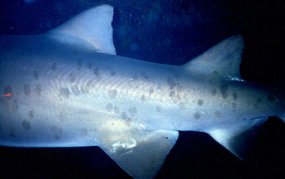|
Ragged toothed sharks, or "raggies" as they are known, can be seen at popular scuba diving locations such as Aliwal Shoal, an offshore reef near Umkomaas which is about 50 km south of Durban. Although they have a formidable set of spiky teeth, the ragged tooth sharks are harmless and are placid enough to allow scuba divers to dive with and observe these sharks in their natural environment.

The opportunity to dive with these sharks is rapidly gaining in popularity so there is an increase in the numbers of divers visiting the sites frequented by the sharks.
Worldwide, interest in shark-watching has grown considerably, and Aliwal Shoal has the potential to become a premier shark-watching destination. Tourism activities which make use of, and rely on, the natural environment are encouraged as a means of promoting sustainable development. South Africa's natural resources, particularly on the coast, are abundant, diverse and provide numerous opportunities for exploitation as tourist attractions. Such exploitation, however, should be sustainable and should ensure that ecological integrity is maintained while opportunities for economic and social development should be maximised.
Maintaining ecological integrity has been a concern of several dive operators at Umkomaas particularly with respect to the perceived impact of recreational scuba divers on the ragged tooth sharks. The impacts of the divers on the sharks' behaviour, distribution and reproductive success has not been assessed.

One part of the project is to photograph the sharks and to catalogue identifiable features such as notches or damaged fins, and spot patterns on the fins and on the flanks of the sharks. These features are then used to identify individuals and to track the length of their stay on the Aliwal Shoal.
There are fears that increased shark-diving activity will have a severe impact on the sharks themselves, and ultimately on the diving operators and the local socio-economic circumstances of Umkomaas.
The concept of sustainability is not limited to consideration of biological or ecological systems alone. A sustainable ecotourism activity must ensure that ecological integrity is maintained. The venture must also be financially viable, and take into account any long-term factors that may affect economic sustainability. Finally, true sustainability must incorporate social considerations. The activity should be in line with local development aspirations and help to meet needs such as employment, education, security and leisure. Issues of accountability and governance are also important determinants of whether sustainability can be achieved. These factors all need to be understood if the shark-diving activity at Umkomaas is to be managed in a way that is acceptable to the majority of participants.
|